All press releases
A Nurse, a Firefighter, and Developers Take Top Award with Health Solution for First Responders: IBM and David Clark Cause Announce Call for Code 2019 Global Prize Winner
NEW YORK, Oct. 12, 2019 /PRNewswire/ -- The winner of the Call for Code 2019 Global Challenge was announced today: A system that uses artificial intelligence and the internet of things to guard the safety of firefighters as they battle blazes.
The winning project, Prometeo, submitted by a team from Barcelona, was announced by the competition's Founding Partner, IBM (NYSE: IBM), and Creator, David Clark Cause, during a celebration at the United Nations Delegates Dining Room in New York City.
The Prometeo team, which includes a nurse, a firefighter and software developers, will receive the Call for Code grand prize of USD $200,000.
Through IBM's $25 million Code and Response initiative that fosters the creation and deployment of open source technologies to help solve some of society's most pressing challenges, the team will receive deployment support from IBM, The Linux Foundation, and other partners interested in scaling their solution. As part of the program, Prometeo will also be further developed and deployed via the IBM Corporate Service Corps in communities in greatest need.
Call for Code is a $30 million, five-year global initiative which, together with Charitable Partner United Nations Human Rights, has become one of the largest and most ambitious efforts bringing together start-up, academic, and enterprise developers to address pressing societal issues. Building on last year's inaugural challenge, Call for Code 2019 focused on creating solutions to help mitigate the impacts of natural disasters and enable first responders to better support survivors.
"Prometeo is an outstanding solution because it leverages the real experiences of first responders and technologists who have witnessed the human toll of wildfires," said Mami Mizutori, Special Representative of the UN Secretary-General (SRSG) for Disaster Risk Reduction. "In Europe so far this year, authorities have recorded more than 2,000 wildfires, which is three times higher than average over the past decade. It's more important than ever that we do everything we can to protect firefighters, as they risk their lives to protect us."
The Prometeo team is composed of veteran firefighter Joan Herrera, emergency medical nurse Vicenç Padró, and three developers and data scientists: Salomé Valero, Josep Ràfols, and Marco Rodriguez. Together they created a combination hardware-software solution based on multiple IBM Cloud services. The health device—which is about the size of a smartphone and straps to a firefighter's arm—has multiple sensors that measure key variables including temperature, humidity, and smoke concentration. This information is collected and transmitted to IBM's Cloud IoT platform. A Node-RED workflow then sends the data to the IBM Watson-based machine learning model, which distills the information into a simple color-coded status for fire command centers to monitor the health of each deployed firefighter in real-time.
"We need to do something to help our firefighters," Valero said. "For me, they are our heroes. They are putting their lives on the line for us. My dream is to help them with Prometeo." Prometeo stores the health information in an IBM Cloudant database, providing an historical and comprehensive view of the data. Any future client – such as authorized fire command centers tasked with tracking firefighters in the field – can connect to the Prometeo dashboard by simply using JavaScript and WebSockets.
More than 180,000 individuals from 165 nations participated in Call for Code and Code and Response this year. They included independent and enterprise developers, data scientists, activists, and students. The teams used The Weather Company data and open source-powered technology – including IBM Cloud, IBM Watson, and IBM Blockchain – to create more than 5,000 applications to help prepare for and mitigate the impact of natural disasters.
"The response for this year's Call for Code has been overwhelming,'' said Bob Lord, IBM Senior Vice President Cognitive Applications and Developer Ecosystems. ''And simultaneously through Code and Response we are solving societal challenges at scale by matching open source technologies with IBM innovations like Watson, IBM Blockchain, Weather, and IoT. Last year's winning solution, Project Owl, recently completed their most significant technology deployment in areas of Puerto Rico that are still recovering from the devastation of Hurricane Maria. A great solution like Project Owl, born from the need in Puerto Rico, will be made available through open source in places of need like Osaka, Japan and Goa, India, to help save lives."
Over the past year Project Owl's two-part hardware-software solution has been further enhanced, and the team is collaborating with first responders, civilians, students, university administrators, and government officials in Puerto Rico. Video highlights of the most recent Project Owl deployment are available here.
"In recent weeks, we have seen devastating news coming from the Bahamas as the true toll of Hurricane Dorian comes to light. And even two years after Hurricanes Irma and Maria, communities across the Caribbean are still recovering," said President Clinton, who served as an eminent judge for this year's challenge. "We know that we can use technology to reduce the impacts of disasters, mobilize resources more quickly, and save lives. This year, the Call for Code Global Challenge brought together the best and brightest minds to improve disaster preparedness and response."
The Call for Code Challenge's eminent judges include:
- Distinguished Judge: Bill Clinton, Founder and Board Chair, Clinton Foundation and 42nd President of the United States
- Stewart Butterfield, CEO and co-founder of Slack
- Steve Ewell, Executive Director, Consumer Technology Association Foundation
- Mariya Gabriel, European Commissioner for Digital Economy and Society
- Kate Gilmore, United Nations Deputy High Commissioner for Human Rights
- Dr. Elizabeth Hausler, Founder and CEO of Build Change
- Mami Mizutori, Special Representative of the UN Secretary-General (SRSG) for Disaster Risk Reduction and head of the United Nations Office for Disaster Risk Reduction
- Claudia Nemat, Member of the Deutsche Telekom AG Board of Management, Technology and Innovation
- Michelle Nunn, President and CEO of CARE USA
- Tom Peck, Executive VP and Chief Information and Digital Officer, Ingram Micro Inc.
- Trevor Riggen, Senior Vice President, Disaster Cycle Services, American Red Cross
- Jim Zemlin, Executive Director, The Linux Foundation
David Clark, Creator of the Call for Code Global Initiative, said the competition was achieving its purpose. "I'd like to thank our judges,'' Clark said. ''Call for Code was formed to inspire and empower the 24 million developers around the world to create tech solutions to solve some of the toughest social challenges we face. Last year's Call for Code Global Challenge was the largest engagement of developers in history, and this year it has nearly doubled in size! We'd like to thank everyone around the world who participated. It's this kind of global effort that is going to create real change for the better."
The five Call for Code 2019 Global Challenge finalist teams were all recognized and honored at Saturday's event. In addition to first-place finisher Prometeo:
- Second place was awarded to Sparrow—whose members hail from India, China, and the US. The Sparrow team developed an open source conversational AI platform that helps users address their physical and psychological well-being during and after natural disasters by matching them with automated support and live experts. Sparrow was awarded USD $25,000.
- Third place awarded to Rove, an SMS chatbot that uses natural language understanding to give users health information during a natural disaster. Rove was awarded USD $25,000.
- Fourth place AsTeR was awarded USD $10,000.
- Fifth place Healios was awarded USD $10,000.
These solutions will also receive support from IBM and The Linux Foundation to establish open source projects through Code and Response. A summary of the top five finalist solutions can be read here: https://developer.ibm.com/callforcode/projects/
For more information about Call for Code, visit https://callforcode.org/
For information about the IBM Developer community, visit https://developer.ibm.com/
For information about David Clark Cause, visit https://davidclarkcause.com/
Media Contacts:
Mike Sefanov
650-281-8099
mike.sefanov@ibm.com
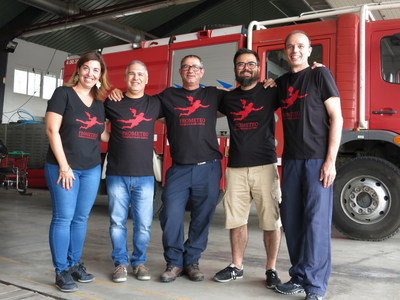
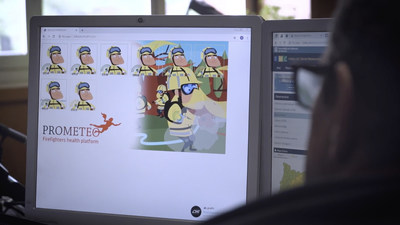
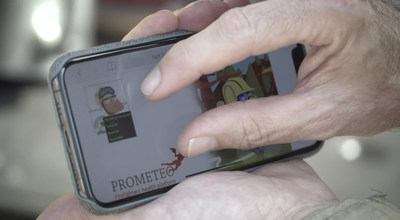
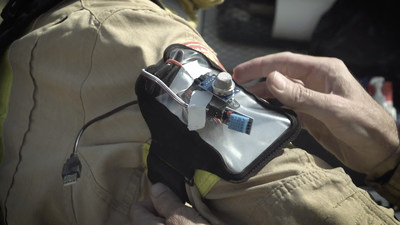
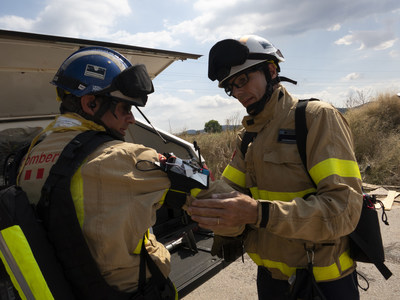

SOURCE IBM

- IBM Prometeo Team
- IBM Prometeo Dashboard
- IBM Prometeo App
- IBM Prometeo Device
- IMG Joan Herrera and Vicenc Ferres Padro
- IBM PROMETEO
- IBM Project Owl